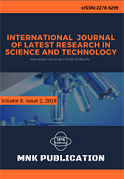DOI:10.29111/ijlrst ISRA Impact Factor:3.35, Peer-reviewed, Open-access Journal
Research Paper Open Access
International Journal of Latest Research in Science and Technology Vol.4 Issue 3, pp 28-31,Year 2015
Correspondence should be addressed to :
Received : 11 June 2015; Accepted : 22 June 2015 ; Published : 30 June 2015

| Download | 125 |
|---|---|
| View | 178 |
| Article No. | 10521 |
The science of complexity contains a plethora of models and ideas through which we can interpret and understand the world around us. Thus, we keep an eye on reality throughout, touching on the practical benefits of gaining an understanding of complex systems. Agent based modeling is a methodology that has been driving a lot of research in complex systems. In this work, we present how agent-based models enable us to explore and understand complexity in economic systems.
Copyright © 2015 Nawfal Naciri et al. This is an open access article distributed under the Creative Commons Attribution 4.0 International (CC BY 4.0) license which permits unrestricted use, distribution, and reproduction in any medium, provided the original work is properly cited.
Nawfal Naciri, Mohamed Tkiouat , " Understanding Complexity In Economic Systems With Agent Based Modeling ", International Journal of Latest Research in Science and Technology . Vol. 4, Issue 3, pp 28-31 , 2015

MNK Publication was founded in 2012 to upholder revolutionary ideas that would advance the research and practice of business and management. Today, we comply with to advance fresh thinking in latest scientific fields where we think we can make a real difference and growth now also including medical and social care, education,management and engineering.

We offers several opportunities for partnership and tie-up with individual, corporate and organizational level. We are working on the open access platform. Editors, authors, readers, librarians and conference organizer can work together. We are giving open opportunities to all. Our team is always willing to work and collaborate to promote open access publication.

Our Journals provide one of the strongest International open access platform for research communities. Our conference proceeding services provide conference organizers a privileged platform for publishing extended conference papers as journal publications. It is deliberated to disseminate scientific research and to establish long term International collaborations and partnerships with academic communities and conference organizers.